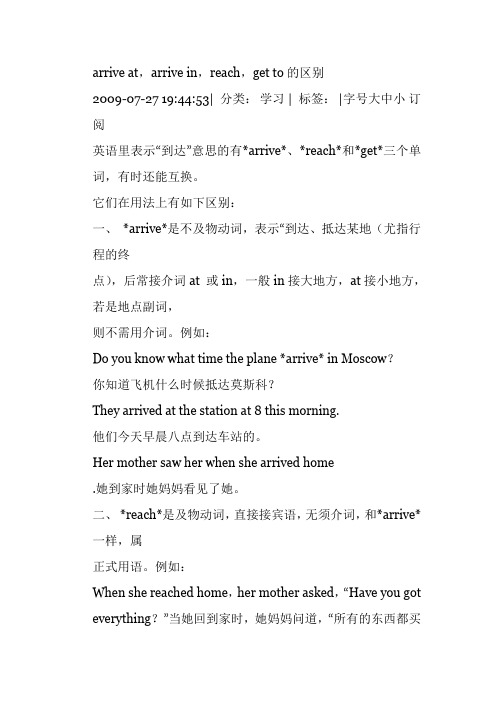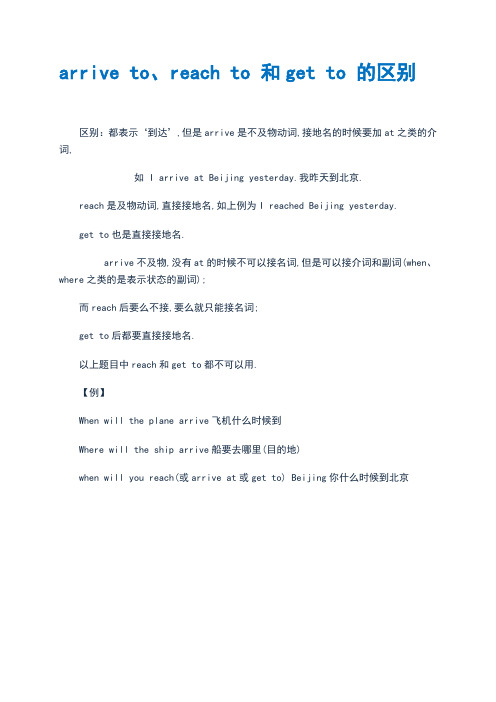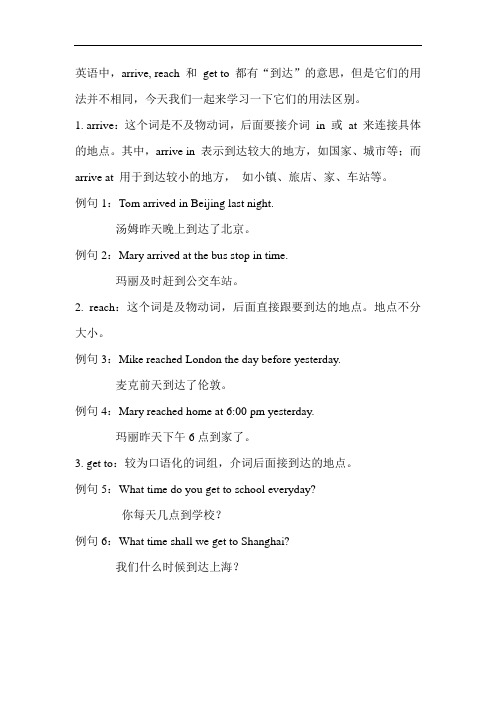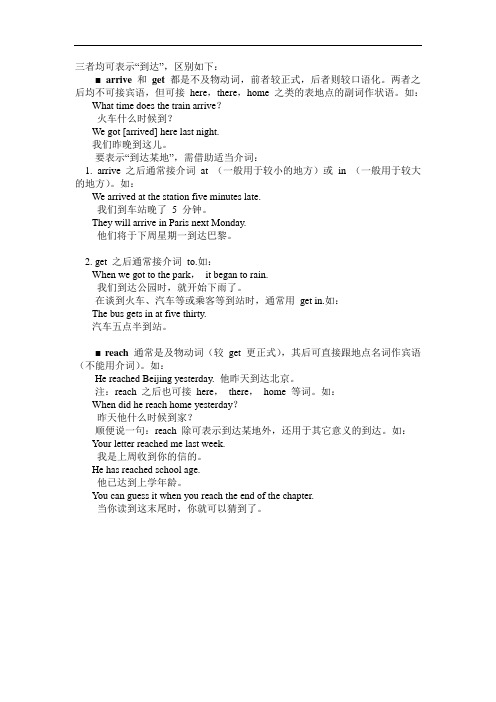arrivein,arriveat,reach和getto的用法和区别
- 格式:doc
- 大小:14.50 KB
- 文档页数:3

get to / arrive in/arrive at/ reach/的区别(1)arrive at + 小地点;arrive in+大地点(如国家,城市,地区等);arrive +地点副词They arrived at the station at eight o’clock this morning.他们今天早上八点到达车站。
When we arrived at Wuhan Airport, it's midnight.When did you arrive in Beijing?(2)reach+地点,无须介词,They reached Beijing on 17 February.他们2月17到达北京。
(3)get to+地点;How can I get to the post office? 我怎样才能到达邮局。
Have we got to the zoo yet?我们到动物园了吗?(4.)get to 和arrive in / arrive at 后的地点为地点副词时,to/in/at 介词必须省略掉;reach 仍然直接加地点副词。
常见地点副词:here / there/ home / where / abroad / over there ...She arrived home late yesterday.她昨天很晚到家。
The visitors got there last night.参观的人昨晚到这儿的。
When she reached home,her mother asked,“Have you got everything?”当她回到家时,她妈妈问道,“所有的东西都买了吗?”小结:从上面的句子可以看出,这三个词都可表示“到达”之意,但三者的用法却不尽相同:get是一个不及物动词,其后可直接跟上副词,当在其后接名词时应用get to;arrive也是一个不及物动词,当其后跟上名词时应用介词in或at,当后面的地点为一个大地方用介词in,当后面的地点为小地方时则应用介词at;reach则是一个及物动词,其后无论是接副词还是名词均不可用介词。

arrive at,arrive in,reach,get to的区别2009-07-27 19:44:53| 分类:学习 | 标签: |字号大中小订阅英语里表示“到达”意思的有*arrive*、*reach*和*get*三个单词,有时还能互换。
它们在用法上有如下区别:一、*arrive*是不及物动词,表示“到达、抵达某地(尤指行程的终点),后常接介词at 或in,一般in接大地方,at接小地方,若是地点副词,则不需用介词。
例如:Do you know what time the plane *arrive* in Moscow?你知道飞机什么时候抵达莫斯科?They arrived at the station at 8 this morning.他们今天早晨八点到达车站的。
Her mother saw her when she arrived home.她到家时她妈妈看见了她。
二、*reach*是及物动词,直接接宾语,无须介词,和*arrive*一样,属正式用语。
例如:When she reached home,her mother asked,“Have you got everything?”当她回到家时,她妈妈问道,“所有的东西都买了吗?”They reached Beijing on February 17.他们于二月十七日到达北京。
三、和*arrive*一样,*get*也是不及物动词,只是它多用于口语,其后接的介词是to,后面如接副词,则不用介词to。
例如:I *get* to school at about 7:30 every day,and I *get* home at 5:00 in the afternoon..我每天7:30到校,下午5:00到家。
Have we got to the zoo yet?我们到动物园了吗?The visitors got there last night.参观的人昨晚到这儿的。

arrive to、reach to 和get to 的区别
区别:都表示‘到达’,但是arrive是不及物动词,接地名的时候要加at之类的介词,
如 I arrive at Beijing yesterday.我昨天到北京.
reach是及物动词,直接接地名,如上例为I reached Beijing yesterday.
get to也是直接接地名.
arrive不及物,没有at的时候不可以接名词,但是可以接介词和副词(when、where之类的是表示状态的副词);
而reach后要么不接,要么就只能接名词;
get to后都要直接接地名.
以上题目中reach和get to都不可以用.
【例】
When will the plane arrive飞机什么时候到
Where will the ship arrive船要去哪里(目的地)
when will you reach(或arrive at或get to) Beijing你什么时候到北京。

英语中,arrive, reach 和get to 都有“到达”的意思,但是它们的用法并不相同,今天我们一起来学习一下它们的用法区别。
1. arrive:这个词是不及物动词,后面要接介词in 或at 来连接具体的地点。
其中,arrive in 表示到达较大的地方,如国家、城市等;而arrive at 用于到达较小的地方,如小镇、旅店、家、车站等。
例句1:Tom arrived in Beijing last night.
汤姆昨天晚上到达了北京。
例句2:Mary arrived at the bus stop in time.
玛丽及时赶到公交车站。
2. reach:这个词是及物动词,后面直接跟要到达的地点。
地点不分大小。
例句3:Mike reached London the day before yesterday.
麦克前天到达了伦敦。
例句4:Mary reached home at 6:00 pm yesterday.
玛丽昨天下午6点到家了。
3. get to:较为口语化的词组,介词后面接到达的地点。
例句5:What time do you get to school everyday?
你每天几点到学校?
例句6:What time shall we get to Shanghai?
我们什么时候到达上海?。

三者均可表示“到达”,区别如下:■arrive和get都是不及物动词,前者较正式,后者则较口语化。
两者之后均不可接宾语,但可接here,there,home 之类的表地点的副词作状语。
如:What time does the train arrive?火车什么时候到?We got [arrived] here last night.我们昨晚到这儿。
要表示“到达某地”,需借助适当介词:1. arrive 之后通常接介词at (一般用于较小的地方)或in (一般用于较大的地方)。
如:We arrived at the station five minutes late.我们到车站晚了5 分钟。
They will arrive in Paris next Monday.他们将于下周星期一到达巴黎。
2. get 之后通常接介词to.如:When we got to the park,it began to rain.我们到达公园时,就开始下雨了。
在谈到火车、汽车等或乘客等到站时,通常用get in.如:The bus gets in at five thirty.汽车五点半到站。
■reach通常是及物动词(较get 更正式),其后可直接跟地点名词作宾语(不能用介词)。
如:He reached Beijing yesterday. 他昨天到达北京。
注:reach 之后也可接here,there,home 等词。
如:When did he reach home yesterday?昨天他什么时候到家?顺便说一句:reach 除可表示到达某地外,还用于其它意义的到达。
如:Your letter reached me last week.我是上周收到你的信的。
He has reached school age.他已达到上学年龄。
You can guess it when you reach the end of the chapter.当你读到这末尾时,你就可以猜到了。

arrive in, arriveat, reach和g et to 的用法和区别辨析:reach,get to和arri ve in(at)这一组词均表达“到达”之意。
reach 是及物动词,后面必须接表地点的名词做宾语;get必须和t o一起表示“到达”之意,arrive是不及物动词,其后若接大地点时,常用介词in,若接小地点时,则用介词at,若是用副词表达地点,get to和arri ve in (at)后面的介词均省去。
例如:1) We arrived at the station five minutes late. 我们到车站晚了五分钟。
2) They will arrive in Paris next Monday.他们将于下周星期一到达巴黎。
3) How can I get to the post office?我怎样才能到达邮局。
4) They reached the top of the mountai ns. 他们到达了山顶。
练习:一.用arrive in、arriveat、get to、reach的适当形式填空。
1. We __________ the station five minutes late. 我们到车站晚了5 分钟。
2. They will __________Par is next Monday.他们将于下周星期一到达巴黎。
3. When we __________ the park, it began to rain.我们到达公园时,就开始下雨了。
4. He__________Beijing yesterd ay. 他昨天到达北京。
5. When did he __________ home yesterd ay? 昨天他什么时候到家?6.Your letter___________ me last week. 我是上周收到你的信的。
arrive in, arrive at, reach和get to 的用法注:若是用副词表达地点,get to和arrive in (at)后面的介词均省去。
例如:1.We arrive there at 7 o’clock.我们7点到那儿。
2.Mr Li got ______ home at last.李先生终于到家了。
【梯度训练】一.用arrive in、arrive at、get to、reach的适当形式填空。
1. We __________ the station five minutes late.我们到车站晚了5 分钟。
2. They will __________Paris next Monday.他们将于下周星期一到达巴黎。
3. When we __________ the park, it began to rain.我们到达公园时,就开始下雨了。
4. He__________ Beijing yesterday. 他昨天到达北京。
5. When did he __________ home yesterday? 昨天他什么时候到家?6.Your letter___________ me last week. 我是上周收到你的信的。
7. He has__________school age. 他已达到上学年龄。
8. You can guess it when you_________the end of the chapter.当你读到这章末尾时,你就可以猜到了。
9.Do you know what time the plane __________ Moscow?你知道飞机什么时候抵达莫科?10. They__________ the station at 8 this morning.他们今天早晨八点到达车站的。
11. Her mother saw her when she __________home.她到家时她妈妈看见了她。
arrive, get与reach的用法区别三者均可表示“到达”,区别如下:■arrive 和get 都是不及物动词,前者较正式,后者则较口语化。
两者之后均不可接宾语,但可接here, there, home 之类的表地点的副词作状语。
如:What time does the train arrive 火车什么时候到We got [arrived] here last night. 我们昨晚到这儿。
要表示“到达某地”,需借助适当介词:1. arrive 之后通常接介词at (一般用于较小的地方)或in (一般用于较大的地方)。
如:We arrived at the station five minutes late. 我们到车站晚了5 分钟。
They will arrive in Paris next Monday. 他们将于下周星期一到达巴黎。
2. get 之后通常接介词to。
如:When we got to the park, it began to rain. 我们到达公园时,就开始下雨了。
在谈到火车、汽车等或乘客等到站时,通常用get in。
如:The bus gets in at five thirty. 汽车五点半到站。
■reach 通常是及物动词(较get 更正式),其后可直接跟地点名词作宾语(不能用介词)。
如:He reached Beijing yesterday. 他昨天到达北京。
注:reach 之后也可接here, there, home 等词。
如:When did he reach home yesterday 昨天他什么时候到家顺便说一句:reach 除可表示到达某地外,还用于其它意义的到达。
如:Your letter reached me last week. 我是上周收到你的信的。
He has reached school age. 他已达到上学年龄。
You can guess it when you reach the end of the chapter. 当你读到这末尾时,你就可以猜到了。
arrive in, arrive at, reach和get to 的用法和区别辨析:reach,get to和arrive in(at)这一组词均表达“到达”之意。
reach 是及物动词,后面必须接表地点的名词做宾语;get必须和to一起表示“到达”之意,arrive是不及物动词,其后若接大地点时,常用介词in,若接小地点时,则用介词at,若是用副词表达地点,get to和arrive in (at)后面的介词均省去。
例如:1) We arrived at the station five minutes late. 我们到车站晚了五分钟。
2) They will arrive in Paris next Monday. 他们将于下周星期一到达巴黎。
3) How can I get to the post office? 我怎样才能到达邮局。
4) They reached the top of the mountains. 他们到达了山顶。
练习:一.用arrive in、arrive at、get to、reach的适当形式填空。
1. We __________ the station five minutes late. 我们到车站晚了5 分钟。
2. They will __________Paris next Monday. 他们将于下周星期一到达巴黎。
3. When we __________ the park, it began to rain.我们到达公园时,就开始下雨了。
4. He__________ Beijing yesterday. 他昨天到达北京。
5. When did he __________ home yesterday? 昨天他什么时候到家?6.Your letter___________ me last week. 我是上周收到你的信的。
7. He has__________school age. 他已达到上学年龄。
一、reach和arrive的区别1. reach和arrive都可以表示到达某个地点或达到某个目的地,但在使用上有一些区别。
2. reach通常表示“到达、抵达”某地,特别强调的是“达到”的动作,强调达到目的地或目的地的某个部分。
3. arrive也可以表示到达某个地点,但它更多的是指全面性的到达,通常指从一个地方到另一个地方的全面性到达,从而衍生出其他的含义,例如“达到某种情况或状态”。
4. 举例:- Did you reach your destination?(你到达了目的地吗?)- When will the tr本人n arrive?(火车什么时候到站?)二、reach的用法1. reach通常用来描述“达到目的地”或“到达目的地的某个部分”。
2. reach后面可以跟名词或代词作为宾语,表示到达的目的地或目的地的某个部分。
3. reach还可以带动词的ing形式作为宾语,表示到达某个连续的动作状态。
4. reach还可以带疑问词what, who, where, when, how等,构成特殊疑问句,表示询问到达的情况。
5. 举例:- We reached the top of the mount本人n at sunset.(我们在日落时到达了山顶。
)- He reached out his hand and touched her shoulder.(他伸出手摸了摸她的肩膀。
)- What time did you reach home last night?(你昨晚几点到家的?)三、arrive的用法1. arrive通常用来描述“到达某个地方”或“到达某种情况或状态”。
2. arrive后面通常跟表示地点的名词作为宾语,表示到达某个地点。
3. arrive还可以带状语从句作为宾语,表示到达某种情况或状态。
4. 举例:- The tr本人n will arrive at 10 o'clock.(列车将于10点到达。
arrivein,arriveat,reach和getto的用法和区别
辨析:reach,get to和arrive in(at)
这一组词均表达“到达”之意。
reach 是及物动词,后面必须接表地点的名词做宾语;get必须和to一起表示“到达”之意,arrive是不及物动词,其后若接大地点时,常用介词in,若接小地点时,则用介词at,若是用副词表达地点,get to 和arrive in (at)后面的介词均省去。
例如:
1) We arrived at the station five minutes late. 我们到车站晚了五分钟。
2) They will arrive in Paris next Monday. 他们将于下周星期一到达巴黎。
3) How can I get to the post office? 我怎样才能到达邮局。
4) They reached the top of the mountains. 他们到达了山顶。
练习:
一.用arrive in、arrive at、get to、reach的适当形式填空。
1. We __________ the station five minutes late. 我们到车站晚了5 分钟。
2. They will __________Paris next Monday. 他们将于下周星期一到达巴黎。
3. When we __________ the park, it began to rain.
我们到达公园时,就开始下雨了。
4. He__________ Beijing yesterday. 他昨天到达北京。
5. When did he __________ home yesterday? 昨天他什么时候到家?
6.Your letter___________ me last week. 我是上周收到你的信的。
7. He has__________school age. 他已达到上学年龄。
8. You can guess it when you_________the end of the chapter. 当你读到这章末尾时,你就可以猜到了。
9. Do you know what time the plane __________ Moscow?你知道飞机什么时候抵达莫科?
10. They__________ the station at 8 this morning.他们今天早晨八点到达车站的。
11. Her mother saw her when she __________home.
她到家时她妈妈看见了她。
12. They __________Beijing on February 17. 他们于二月十七日到达北京。
13. I _________school at about 7:30 every day. 我每天7:30到校。
14. Have we_________the zoo yet?我们到动物园了吗?
二. 单项选择
1. Jane got to the USA a few days ago.
A. arrived
B.arrived in
C. reached to
D. arrived to
2.When he arrived _________ the station,the train had left.
A.at
B.to
C./
D.in
3. Last night they ________ home at _______12:00.
A.got; behind
B.got; around
C.got to; about
D.arrived at, nearly
4. Please tell me when the bus_________.
A.arrives
B.arrives at
C.reaches
D.reaches in
5. Jim and Kate are __________ at their hometown tomorrow.
A.getting to
B.getting
C.reaching to
D.arriving
6. Why do you __________ home so late?
A.get
B.get to
C.arrive in
D. reach to
7.---With the help of Internet,news can _________ every corner of the world.
A.arrive
B.reach
C.go
D.get。